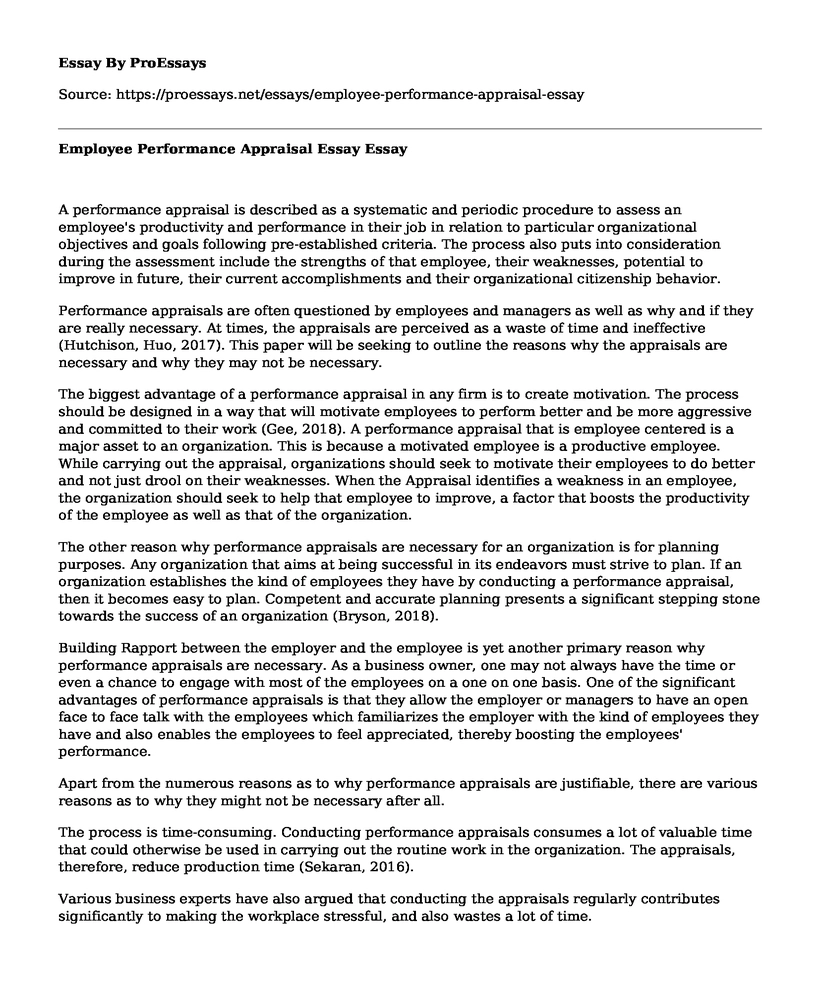A performance appraisal is described as a systematic and periodic procedure to assess an employee's productivity and performance in their job in relation to particular organizational objectives and goals following pre-established criteria. The process also puts into consideration during the assessment include the strengths of that employee, their weaknesses, potential to improve in future, their current accomplishments and their organizational citizenship behavior.
Performance appraisals are often questioned by employees and managers as well as why and if they are really necessary. At times, the appraisals are perceived as a waste of time and ineffective (Hutchison, Huo, 2017). This paper will be seeking to outline the reasons why the appraisals are necessary and why they may not be necessary.
The biggest advantage of a performance appraisal in any firm is to create motivation. The process should be designed in a way that will motivate employees to perform better and be more aggressive and committed to their work (Gee, 2018). A performance appraisal that is employee centered is a major asset to an organization. This is because a motivated employee is a productive employee. While carrying out the appraisal, organizations should seek to motivate their employees to do better and not just drool on their weaknesses. When the Appraisal identifies a weakness in an employee, the organization should seek to help that employee to improve, a factor that boosts the productivity of the employee as well as that of the organization.
The other reason why performance appraisals are necessary for an organization is for planning purposes. Any organization that aims at being successful in its endeavors must strive to plan. If an organization establishes the kind of employees they have by conducting a performance appraisal, then it becomes easy to plan. Competent and accurate planning presents a significant stepping stone towards the success of an organization (Bryson, 2018).
Building Rapport between the employer and the employee is yet another primary reason why performance appraisals are necessary. As a business owner, one may not always have the time or even a chance to engage with most of the employees on a one on one basis. One of the significant advantages of performance appraisals is that they allow the employer or managers to have an open face to face talk with the employees which familiarizes the employer with the kind of employees they have and also enables the employees to feel appreciated, thereby boosting the employees' performance.
Apart from the numerous reasons as to why performance appraisals are justifiable, there are various reasons as to why they might not be necessary after all.
The process is time-consuming. Conducting performance appraisals consumes a lot of valuable time that could otherwise be used in carrying out the routine work in the organization. The appraisals, therefore, reduce production time (Sekaran, 2016).
Various business experts have also argued that conducting the appraisals regularly contributes significantly to making the workplace stressful, and also wastes a lot of time.
Conclusion
Performance appraisals may not always be a walk in the park for employees, managers and business owners. However, in my argument, I find them necessary and contributing quite much in the overall productivity of an organization. Considering the numerous advantages that can be enlisted with conducting the appraisals such as the ease to document employee's performances and the ability to extract feedback from employees about how they would opt the business management to improve on their welfare, it is arguable that the pros of appraisals outweigh the cons. This means that performance appraisals are still a significant contribution to the success of an organization and should not be scrapped off.
References
Bryson, J. M. (2018). Strategic planning for public and nonprofit organizations: A guide to strengthening and sustaining organizational achievement. John Wiley & Sons.
Gee, J. (2018). The new work order. Routledge.
Hutchison, A., & Huo, M. (2017). Performance Management in New Zealand: Human Resource Practitioners', Managers', and Employees' Perspectives. New Zealand Journal of Human Resources Management, 17(1).
Sekaran, U., & Bougie, R. (2016). Research methods for business: A skill building approach. John Wiley & Sons.
Cite this page
Employee Performance Appraisal Essay. (2022, Jun 17). Retrieved from https://proessays.net/essays/employee-performance-appraisal-essay
If you are the original author of this essay and no longer wish to have it published on the ProEssays website, please click below to request its removal:
- Leadership Interview Paper Example
- Anthropology Analysis of Attitude Towards People Depending on the Profession
- Corporate Social Responsibility Research Paper Example
- Professional Identity and Stewardship as a Neurosurgical Nursing Specialist Paper Example
- Essay on Nurse Educators: The Driving Force Behind Skilled Nursing Professionals
- Essay Example on Cultural Diversity in the Workplace: Benefits and Challenges
- Essay on Interviewing Health Care Professionals: Putting Learning Into Practice







